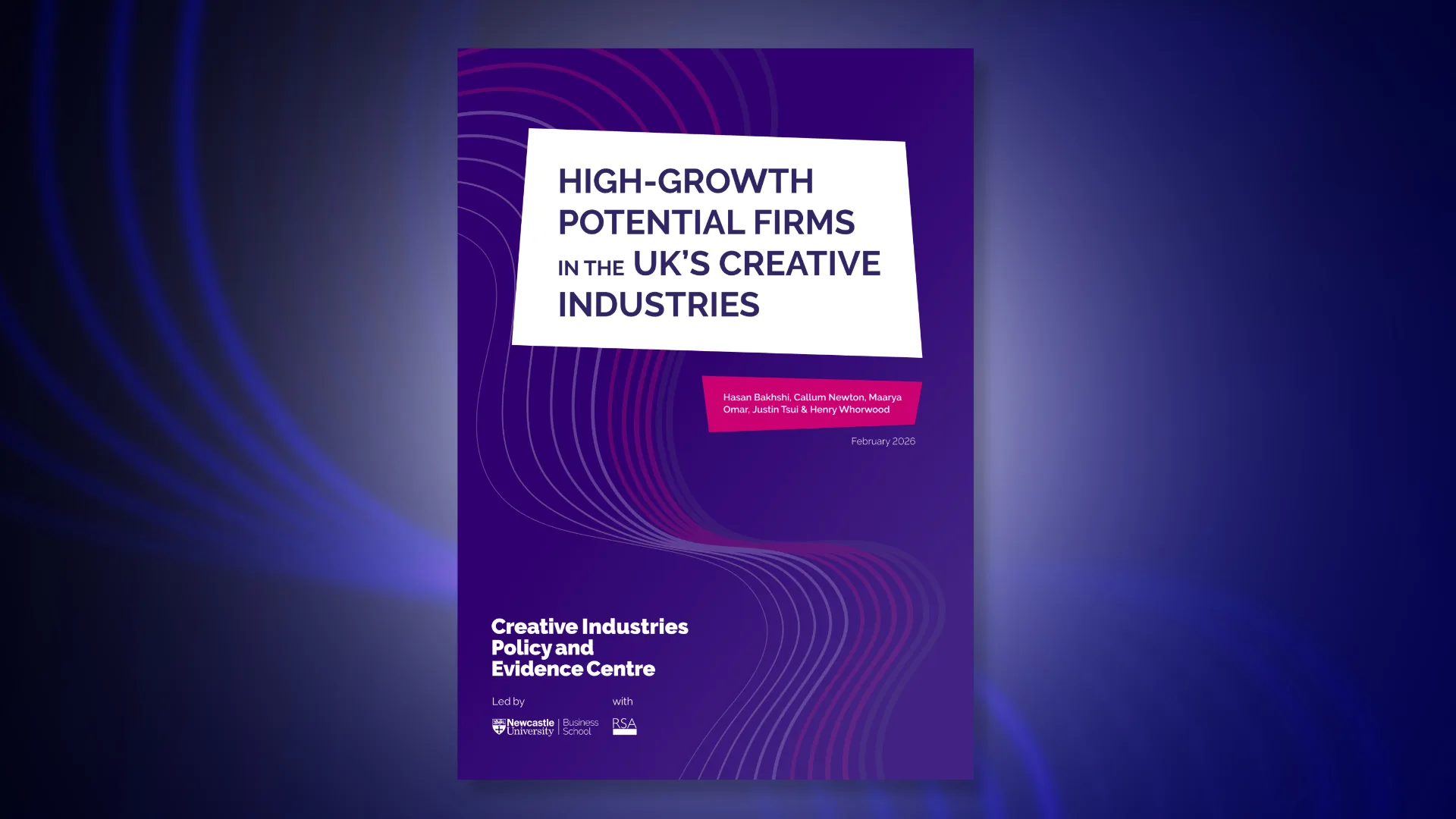A sector by sector overview of activity taking place in the creative industries to achieve Net Zero
Wednesday 19 October 2022 – Ahead of COP 27, a landmark new report brings together for the first time a sector by sector overview of the creative industries, and the huge amount of activity taking place to work towards net zero. The report finds that across all sub-sectors including; architecture, design, fashion, film, galleries, games design, museums, music and publishing, the creative sector is innovating in production, design and supply.
The report identifies key successes but also highlights the barriers to progress for each sub-sector and where further action is needed. Government support to encourage the industry-led action would be welcome and specifically more investment for applied research is needed. It is hoped the report will highlight gaps in our knowledge, demonstrate where sectors can learn from each other, and serve as a much needed call to action.
The report includes interviews with representatives from Arts Council England, Association of Independent Music, British Fashion Council, British Film Institute, Creative Scotland, Creative Wales, Future Screens Northern Ireland, Galleries Climate Coalition, Design Council, Publishers Association, Royal Institute of British Architects and many more as well as case studies from individual performing arts venues, festivals and creative businesses. Commissioned by the Arts and Humanities Research Council (AHRC)-funded Creative Industries Policy and Evidence Centre (PEC), and produced by cultural and environmental specialists Julie’s Bicycle.
Alison Tickell, Founder and CEO of Julie’s Bicycle says:
“For so long we’ve asked what is needed to motivate the political, economic and social change urgently needed. This report provides an answer; culture. Not only do the arts motivate change through storytelling and the unique ability to inspire connection and empathy but on a very practical level; it is these industries that across all sub-sectors are adapting their processes and monitoring impact. We find clear evidence of a willingness to learn and change from CEOs, boards, employees and artists themselves; it is clear culture is ready to prioritise change.”
Professor Christopher Smith, Executive Chair, Arts and Humanities Research Council (AHRC) says:
“Climate change and environmental issues are now at the top of the agenda for creative businesses, from international corporations to start-ups. There are dozens of innovative projects and tools to help reduce carbon emissions, and some are supported through UKRI. But there is so much more to do. This report is a starting point and a call to action”.
Hasan Bakhshi, Director of the Creative Industries Policy and Evidence Centre says:
“The Creative Industries are an economic powerhouse, delivering £115.9bn GVA to the UK economy, accounting for 2.2 million jobs, and exporting more than £50bn per year at the last count. As a sector so embedded in the supply chains of others, it’s clear the government needs to work with the Creative Industries to achieve net zero goals. Key to this is incentivising more investment in innovation. At Creative PEC we are calling for a change to the definitions of Research and Development (R&D) used by the HMRC for tax relief, which currently excludes arts, humanities and social sciences. Without this we risk under-incentivising Creative Industries companies who want to experiment with new production and supply methods to reduce carbon emissions”.
The report highlights good practice examples such as the Publishing Association working with the Research Institutes of Sweden (RISE) on a carbon calculator to allow companies to generate their own data and contribute to aggregate data for the sector. 90 of the UK’s major publishing houses have signed up to net zero targets.
In the Games industry the main environmental concern is the energy needed to play games particularly those with ‘dynamically generated worlds’, continual player interaction and large numbers of players across a global network. The Playing for the Planet Alliance, is a new campaign group consisting of 35 big companies and numerous SMEs. It campaigns for carbon footprint reduction across the games industry and champions ‘green activations’ within gaming to raise awareness of conservation amongst players. These are just two examples of the numerous initiatives highlighted in the report.
Eliza Easton, Deputy Director of the Creative Industries Policy & Evidence Centre says:
“The PEC has called for ‘design for good’ to be one of the UK’s major contributions towards global climate discourse. Alongside investment in materials, tools and production, what’s needed is further investment in the design curriculum and skills, to embed good practice in the workplace and across every part of the design process. Continuous professional development opportunities would ensure that skills are refreshed in line with new research and understanding, for instance into new materials. The top two global design schools are in the UK, and this provides a valuable opportunity to help set the agenda”.
The report highlights that the government’s ‘Build Back Greener’ strategy makes little reference to individual sectors, and none at all to the creative industries. Whilst this is understandable for high-level strategy, it is clear from the report that industry would welcome a stronger read across from national priorities to sector policy. For industry activity to be as impactful as possible, a number of challenges need to be overcome and new ways of working established, with the government helping to develop standards and targets to encourage change and guide investment decisions.
The overwhelming takeaway from this first scoping exercise of the Creative Industries, is just how seriously the sector takes its responsibilities in relation to climate. It is largely self-driven rather than regulated, and further support and investment in targeted areas such as R&D, education and skills could provide the catalyst needed.
The message is clear; there is a strong willingness from the creative industries to lead change but macro-level guidelines, investment and partnership are needed.
/ENDS
The report authors are available for interview.
Press contact
Alice Kent alice.kent@nesta.org.uk 07779029055 (Monday-Wednesday) and Anna Zabow 07713 619077 / anna.zabow@nesta.org.uk (Thursday & Friday)
Notes to Editors
1. The new research will be live from 00.01 on 19 October 2022 at: https://pec.ac.uk/research-reports/creative-industries-and-the-climate-emergency
This research was commissioned by the AHRC-funded Creative Industries Policy and Evidence Centre (PEC) and produced by Julie’s Bicycle with BOP Consulting.
2. About the Creative Industries Policy and Evidence Centre (PEC)
The Creative Industries Policy and Evidence Centre (PEC) works to support the growth of the UK’s Creative Industries through the production of independent and authoritative evidence and policy advice. Led by Nesta and funded by the Arts and Humanities Research Council as part of the UK Government’s Industrial Strategy, the Centre comprises a consortium of universities and one joint enterprise from across the UK They are: Birmingham, Cardiff, Edinburgh, Glasgow, Work Advance, London School of Economics, Manchester, Newcastle, Sussex, and Ulster. The PEC works with a diverse range of industry partners including the Creative Industries Federation. To find out more, visit www.pec.ac.uk and @CreativePEC.
3. The Creative Industries Policy and Evidence Centre (PEC) is part of the Creative Industries Clusters Programme, which is funded by the Industrial Strategy Challenge Fund and delivered by the Arts and Humanities Research Council on behalf of UK Research and Innovation.
4. About Julie’s Bicycle
Julie’s Bicycle is a pioneering not-for-profit organisation mobilising the arts and culture to take action on the climate and ecological crisis. Founded by the music industry in 2007 and now working across the arts and culture JB has partnered with over 2000 organisations in the UK and internationally. Combining cultural and environmental expertise, Julie’s Bicycle focuses on high-impact programmes and policy change to meet the climate crisis head-on. We exist at the heart of a thriving informal network of people who share our vision, supporting others on their journey, and helping to catalyse new projects at the intersection of culture and climate. www.juliesbicycle.com
5. About BOP Consulting
BOP Consulting is a global research and consulting practice for culture and the creative economy with a 25-year track record of working globally across sectors. We have worked in over 50 countries with clients from international agencies to national and regional government departments, to city Mayors and regeneration bodies, and individual cultural and creative businesses. www.bop.co.uk
Related News and Press
Creative Industries present huge investment opportunity
New research shows ‘high-growth potential firms’ outnumber both Life Sciences and Advanced Manufactu…
Bolster business and financial support for creative industries micro firms to achieve UK innovation and growth ambitions
New Creative PEC research suggests creative industries micro firms have a vital role to play in driv…
Back the creative industries to grow the economy, says new research showing creative firms are more likely to be innovators and exporters
New research finds a higher share of UK creative MSMEs are exporters compared with the rest of the e…



